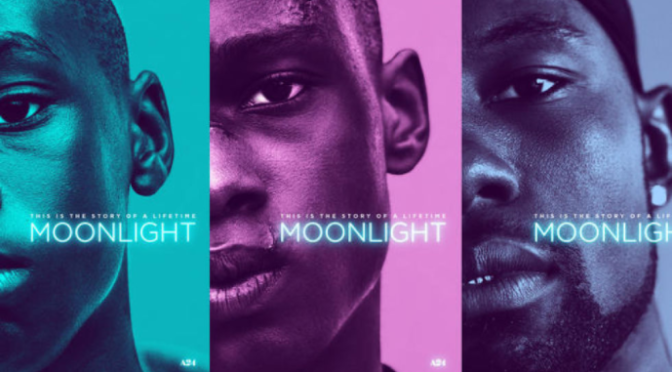It is rare for black audiences to “get” a “serious” movie. Sure, once a year, Hollywood will throw the “demographic” a historical film about civil rights or some other era of oppression in their tortured annals for Oscar nomination reasons, but, in general, the depiction of black life is left to Tyler Perry, another Barbershop installment and, once upon a time, the Wayans Brothers.
And so, more than the fact that Moonlight is a sort of Boyhood for black gay men, Barry Jenkins’ second feature is special because it isn’t necessarily a movie “for black people,” designed to separate audiences because of the specificity of a cultural experience. While, yes, having a mother addicted to crack in the projects isn’t exactly common to white childhood, Moonlight speaks on a global level to the cruel nature of humanity and the flawed system perpetuated by the U.S. (incarceration levels, an inability to get ahead–you know, all that jazz).
That’s why, while in the movie theater, I hear, “Lotta white folks in here.” Whether derogatorily slanted or not, it does indicate what Moonlight is transcending in the genre of “black cinema.” Jenkins’ ability to convey a wide stretch of emotions with a single expression or shot speaks to the perils and pains of being alive as a whole–not merely as a result of being black. Though, of course, Jenkins does speak through the voice of Chiron a.k.a. “Little’s” (Alex Hibbert) surrogate father, Juan (Mahershala Ali), the local drug lord of his Miami neighborhood, by asserting, “Black people are everywhere. Don’t ever let anyone tell you otherwise. We were the first ones on this planet.” It is almost as if to remind those white folks in the audience to know their damn place.
In any case, Juan is filled with such isms and life lessons as these as he watches Little being incessantly bullied by the other kids at school–who can sense he’s what his drug-addicted mother, Paula (Naomie Harris), calls a “faggot”–from afar, and resultantly offers his house as a port in the storm from the trauma of both his scholastic and domestic existence. To further lend comfort is Juan’s live-in girlfriend, Teresa (Janelle Monáe, looking not so androgynous in this role), who lets Little take his time with the few and far between words he does choose to say.
Based on Tarell Alvin McCraney’s In Moonlight Black Boys Look Blue, the simple title of its filmic adaptation is twofold: 1) Juan gets his nickname, “Blue,” from constantly running around in the moonlight as a rebellious child in Cuba and 2) one might say that Chiron is moonlighting as a “normal” boy, in spite of the fact that everyone can see through his act. One boy in particular, Kevin (Jaden Piner), can read Chiron like a book with one glance. Their rapport is solidified one day when Chiron absconds from a kickball game and is pursued by Kevin, who encourages him to fight back against his tormentors and prove he’s not “soft.” When Chiron insists he isn’t, Kevin challenges him to show off his physical strength by pushing him to the ground and getting into a tussle with him. The camerawork hones in on the the sexual rawness of their pretend scuffle, and sets the tone for the rest of their encounters–always tinged with a hint of the forbidden.
And yes, perhaps because Moonlight also centers on the struggle of being gay and coming to terms with all the implications and ramifications of such a still semi taboo sexuality, its net of appeal also extends far past the black community. As Little becomes teenage Chiron (Jharrel Jerome), his path again runs into Kevin’s, who affectionately calls him Black at this point, and tells him how he got detention for having sex with a girl in the hallway and making her moan so loud he got caught. He then makes Chiron promise not to tell anyone, adding with more than a hair of inference, “I know you good at keepin’ a secret.”
When a moment of happenstance prompts things to escalate between Kevin and Chiron, it alters the entire trajectory of Chiron’s life, and leads him to repeat the cycle that feeds into the reliance of low to no income people on drugs–whether selling or buying.
The passage of more time turns Chiron into Black (Trevante Rhodes)–an obvious foil to his mentor, Blue. In this incarnation, he is in direct masculine contrast to his former effete self. But a call from the past leads him back to where it all started and the revelation, “No one’s touched me since you.” And who can’t relate to this level of unfulfilled yearning and unknown pleasure?–black or otherwise.






















